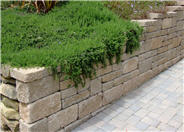
Common name:Prostrate Rosemary
Botanical name:Rosmarinus officinalis 'Prostratus'
The 'Prostratus' grows to a height of 2'-3' with a spread to 8'. Its flowers are pale, lavender blue in color; the leaves are needle-like with a dark, blue-green color. This plant makes a good ground cover, and its leaves can be used as seasoning in cooking.
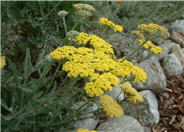
Common name:Yarrow Moonshine
Botanical name:Achillea 'Moonshine'
Pale yellow flowers appear to float on long, slender stems. Leaves are green to gray-green leaves, which are flatter and less divided than those of the Achillea millefolium. Yarrows propagate easily from rooted cuttings or division, which should be performed in the early spring or fall. Following bloom, one should dead head the plant and divide the clumps when it appears crowded.
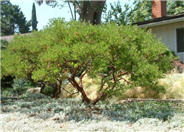
Common name:Howard McMinn Manzanita
Botanical name:Arctostaphylos densiflora 'Howard McMinn
This shrub is highly appreciated for its decorative characteristics, which include a dense show of small, pale pink urn-shaped flowers. Above all, it is the mahogany-red to brown bark (which peels beautifully) that is the major attraction. Its fruit resembles the tike apple, and the flowers contrast perfectly to the light green leaf (which can get rather tough). It blooms from late winter to spring.
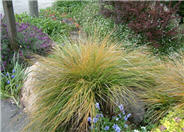
Common name:Pheasant's Tail Grass
Botanical name:Stipa arundinacea
Pheasant's Tail Grass is a beautiful, fine, airy grass that is emerald green in color. It has many soft yellow, beige flower stalks in the spring. This grass grows 10"-12" tall , 1'-2' wide and is drought tolerant.
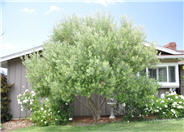
Common name:Olive
Botanical name:Olea europaea
This broad tree will grow to 40' tall and has small, gray green leaves with fleshy black fruit that appears in fall. Purchase fruitless varieties to avoid the mess.
Managing Your Soil
Healthy soil is the cornerstone of a vibrant landscape. It provides oxygen and nutrients vital to plant growth and sustenance. It provides protection from the sun and stability for root systems.
Click in the green box for more information
| Designer: Anon | Two Tiered Plantings |
Photographer: GardenSoft |
Soils and Compost:
Practice grass-cycling by leaving short grass clippings on lawns after mowing, so that nutrients and organic matter are returned to the soil.
Water Saving Tip:
Be sure to fix all leaks promptly no matter how small they may seem.
Integrated Pest Management:
Attract, or buy beneficial insects such as ladybugs and lacewings to control pest outbreaks in your garden.

